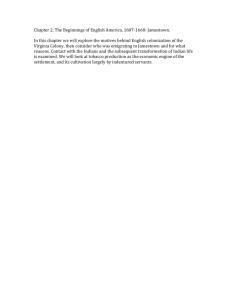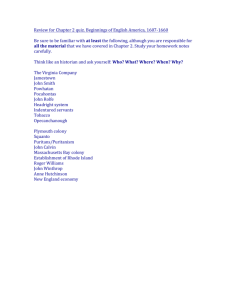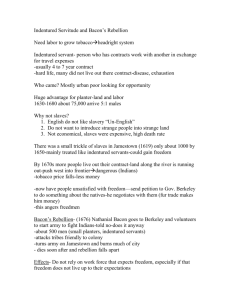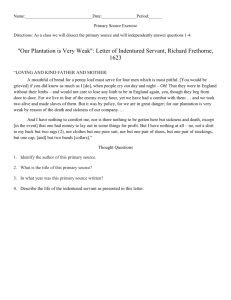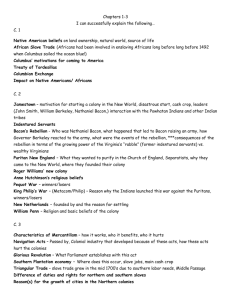Second Marking Period Social Studies Learning Guide
advertisement
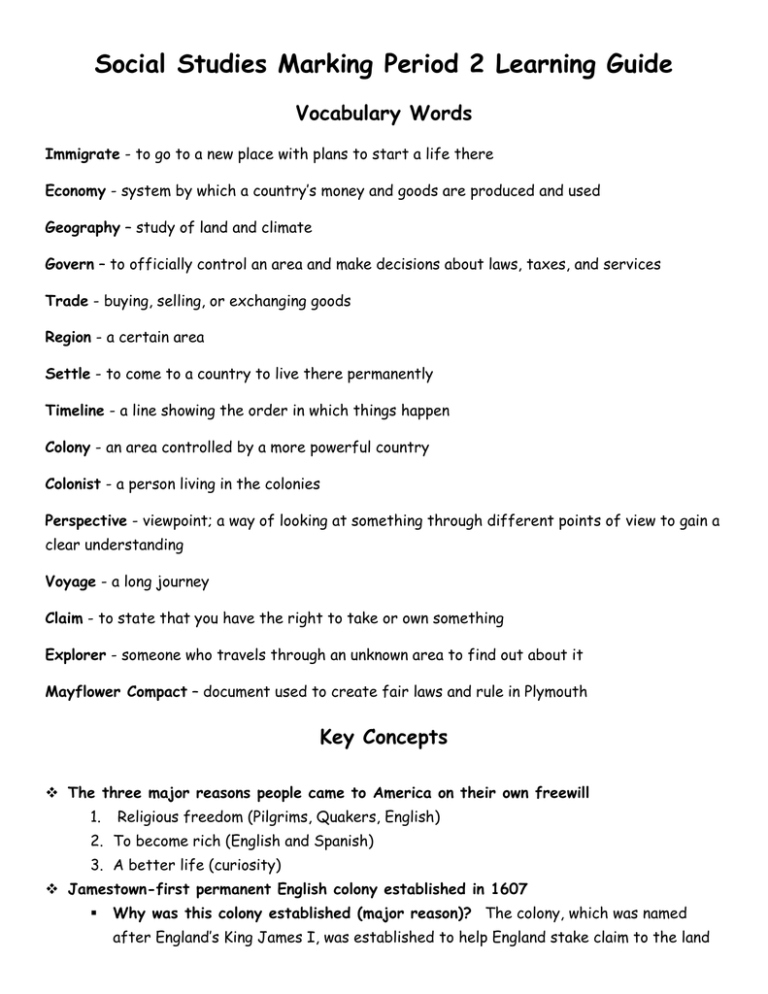
Social Studies Marking Period 2 Learning Guide Vocabulary Words Immigrate - to go to a new place with plans to start a life there Economy - system by which a country’s money and goods are produced and used Geography – study of land and climate Govern – to officially control an area and make decisions about laws, taxes, and services Trade - buying, selling, or exchanging goods Region - a certain area Settle - to come to a country to live there permanently Timeline - a line showing the order in which things happen Colony - an area controlled by a more powerful country Colonist - a person living in the colonies Perspective - viewpoint; a way of looking at something through different points of view to gain a clear understanding Voyage - a long journey Claim - to state that you have the right to take or own something Explorer - someone who travels through an unknown area to find out about it Mayflower Compact – document used to create fair laws and rule in Plymouth Key Concepts The three major reasons people came to America on their own freewill 1. Religious freedom (Pilgrims, Quakers, English) 2. To become rich (English and Spanish) 3. A better life (curiosity) Jamestown-first permanent English colony established in 1607 Why was this colony established (major reason)? The colony, which was named after England’s King James I, was established to help England stake claim to the land and to find gold and silver. The colonists soon discovered that there was no gold or silver to be found in this area. What became the “cash crop” of Jamestown? Tobacco became Jamestown’s cash crop. Indentured Servants What were they guaranteed to be given from their masters (5 needs)? They were guaranteed passage paid from England, food, clothing, shelter, and “freedom dues” when their term was completed. (Freedom dues usually included 50 acres of land, corn, tools, and clothing.) Pros/cons to being an Indentured Servant Pros Free passage to the colonies Provided food, clothing, and shelter After the term was over, the indentured servant received 50 acres of land to farm Cons Required to serve for 4-7 years Often lived in harsh conditions – difficult adjusting to the climate and new diseases A servant was considered his master’s personal property and was not allowed to break the contract How long was their term of service? The term of service was four to seven years. Slavery First slaves were brought against their will from Africa to Virginia in 1619 to help on tobacco plantations What is the triangular trade route? The triangular trade route was a water route where ships would travel with slaves or certain products to be sold in other parts of the world. Slaves would be captured and sent from West Africa to America, then the slaves would be sold for money. The money would be used to purchase sugar, molasses, or tobacco to be shipped to Europe. The goods would be sold to purchase rum and other goods to be sold in Africa. What was life like for a slave? How were they treated? Slaves were captured and taken from their family against their will. They were treated unfairly and forced to live in harsh conditions. Slaves were required to work long hours with little food provided. Slave living quarters provided the bare minimum. Slaves were not allowed to marry or have children without the permission of their “master.” They were not allowed to attend church services or congregate in large groups with other slaves. How was their life different than an Indentured Servant’s life? A slave was captured and forced to come to the colonies, but an indentured servant came on their own free in exchange for passage to the colonies. A slave was forced to work for a “master” for the slave’s whole life unless the master chose to free the slave. An indentured servant could leave after a set amount of time – usually 4-7 years. You should be able to list the names of the first 13 English colonies: New Jersey, Georgia, North Carolina, New York, New Hampshire, South Carolina, Virginia, Massachusetts, Maryland, Rhode Island, Connecticut, Pennsylvania, and Delaware Famous People from the Colonies: Christopher Columbus came to America in 1492. He wanted to head west to find an allwater route to Asia. He opened up the Western Hemisphere to Europe. Anne Hutchinson disagreed with Puritan views. Anne felt that people could pray to God even outside the church, but this view went against the Puritan belief. Anne soon was banished from Massachusetts and moved to Rhode Island. Roger Williams was the founder of Rhode Island. William Penn was a Quaker. King Charles II owned William Penn money. To repay him, the King gave him land in North America. He used the land where Quakers could live without being persecuted. He wanted Pennsylvania to be a place where everyone could live as equals. John Smith was a leader of the Jamestown colony. He demanded the settlers of Jamestown to work. If they did not work, they would not be allowed to eat. He was later captured by Pocahontas’ tribe. Pocahontas saved John Smith’s life when he was captured by Pocahontas’ tribe. She begged her father to spare John’s life. She often took food to the colonists and even warned them about an upcoming attack from the tribe. She later married one of the colonists. Dear Students and Parents, Attached you will find the Learning Guide for the second marking period of Social Studies. A learning guide is a tool that will give key information about the upcoming unit of study and will help students review information that is covered in school at home. I hope that it will lead to interesting discussions about material being covered in class and promote the use of new vocabulary. Other materials will also come home throughout the unit to help with studying for tests or quizzes. Miss Cook
